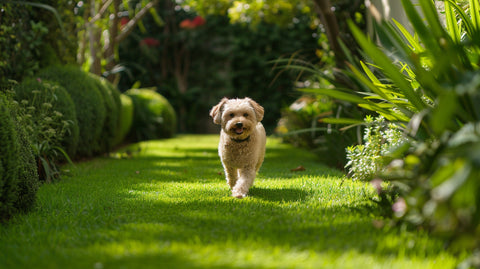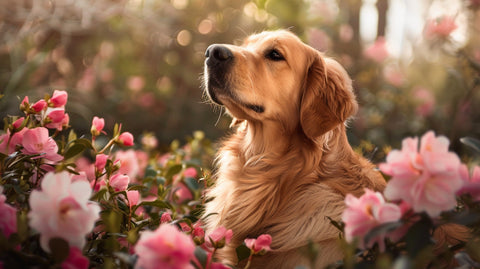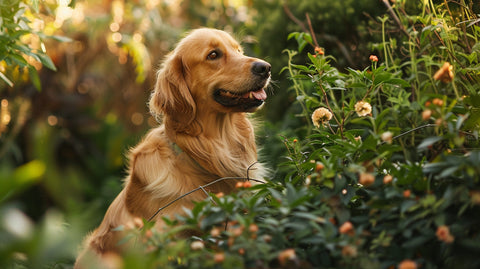Understanding the Problem
The impact of dog urine on grass
Dog urine contains high levels of nitrogen, which can burn and kill grass if not properly managed. This is a common issue faced by many pet owners, leading to unsightly brown patches on otherwise lush lawns.
Common misconceptions about dog urine and grass damage
Contrary to popular belief, it's not just female dogs that cause grass damage with their urine. Both male and female dogs can contribute to the problem. Additionally, the size of the dog and the frequency of urination also play significant roles in the extent of grass damage.

Identifying the Causes
Chemical composition of dog urine
Dog urine contains urea, which is a compound rich in nitrogen. When deposited on grass, urea can result in nitrogen overload, causing the grass to burn and turn brown.
Factors that exacerbate grass damage
Several factors can worsen the effects of dog urine on grass, including concentrated urine, infrequent watering, and specific grass types that are more susceptible to damage.
Solutions to Protect Your Lawn
Adjusting your dog's diet
To effectively reduce the nitrogen content in your dog's urine and minimise grass damage, consider incorporating low-protein options into their diet. Opt for specially formulated dog foods that are designed to promote urinary health and contain balanced levels of nutrients.
Consult with your veterinarian to determine the best diet plan for your pet's specific needs and ensure that any dietary changes are made gradually to avoid digestive upset.
Increasing hydration levels
Ensuring that your dog stays adequately hydrated is crucial for diluting their urine and mitigating its harmful effects on your lawn. Provide access to clean, fresh water at all times, and encourage regular drinking by placing multiple water bowls throughout your home and garden.
Consider adding water to your dog's meals or offering wet food to help increase their overall fluid intake. Additionally, incorporating water-rich fruits and vegetables into their diet can contribute to their hydration levels.
Diluting urine with water
Promptly watering areas where your dog urinates is an effective way to dilute the urine and minimise grass damage.
Keep a watering can or hose nearby when taking your dog outside, and immediately saturate the affected areas with water after they've finished urinating. This dilution process helps to disperse the concentrated nitrogen in the urine, preventing it from causing excessive harm to your lawn.
Consistent and thorough watering can significantly reduce the likelihood of unsightly brown patches appearing in your grass.
Training alternatives for your pet
Training your dog to urinate in designated areas can significantly minimise damage to your lawn.
Create a dedicated potty area in your garden using materials such as gravel, mulch, or synthetic grass. Encourage your dog to use this designated spot by consistently guiding them there during bathroom breaks and rewarding them with praise and treats for compliance.
With patience and consistency, your pet will learn to associate the designated area with urination, reducing the likelihood of accidents on your lawn.
Landscaping solutions to minimise damage
Implementing strategic landscaping features can help divert your dog's urination away from grassy areas and minimise damage to your lawn.
Consider installing raised planters or elevated beds where your dog is less likely to urinate, creating physical barriers between your pet and sensitive grassy areas.
Additionally, incorporate natural barriers such as shrubs or decorative rocks to discourage urination in specific locations. By strategically designing your outdoor space, you can protect your lawn while still providing a safe and enjoyable environment for your furry friend.

Implementing Preventive Measures
Regular lawn maintenance practices
Consistent lawn maintenance is essential for preserving the health and appearance of your grass, especially in areas prone to dog urine damage.
Incorporate regular aerating, fertilising, and overseeding into your lawn care routine to promote robust grass growth and resilience against urine-related stress.
Aeration helps improve soil drainage and allows nutrients to reach grass roots, while fertilising provides essential nutrients for healthy growth.
Additionally, overseeding fills in bare patches and strengthens the overall lawn density, making it more resistant to damage from dog urine.
By prioritising these maintenance tasks, you can maintain a vibrant and resilient lawn that can withstand the challenges posed by pet urine.
Utilising protective products
To further safeguard your lawn against the harmful effects of dog urine, consider utilising specialised protective products designed to deter urination and minimise grass damage.
Urine-neutralising sprays or supplements are formulated to break down the components of urine that contribute to grass discolouration and odour. These products can be applied directly to affected areas of your lawn to mitigate damage and promote recovery.
Incorporating urine-neutralising products into your lawn care regimen provides an additional layer of defence against urine-related stress, helping to maintain a lush and healthy lawn for you and your pet to enjoy.
Seeking Professional Advice
Consulting a veterinarian
Conclusion
In conclusion, preventing dog urine from killing grass requires a combination of dietary adjustments, hydration management, training techniques, and proactive lawn maintenance.
By understanding the causes of grass damage and implementing preventive measures, pet owners can enjoy a lush and healthy lawn while keeping their furry friends happy.
FAQs
-
Does the size of my dog affect the extent of grass damage? Yes, larger dogs tend to produce more urine, which can result in more significant damage to grass if not properly managed.
-
Are certain grass types more resistant to dog urine damage? Some grass varieties, such as Bermuda grass and perennial ryegrass, are more resilient to dog urine compared to others like Kentucky bluegrass or fescue.
-
Can I repair existing grass damage caused by dog urine? Yes, you can repair brown patches by reseeding or sodding damaged areas and implementing preventive measures to prevent future damage.
-
Are there any health risks associated with using urine-neutralising products on my lawn? While most urine-neutralising products are safe for pets and humans, it's essential to follow the manufacturer's instructions carefully to avoid any potential risks.
-
How long does it take for grass to recover from dog urine damage? The recovery time depends on various factors such as the severity of the damage, the health of the grass, and the effectiveness of preventive measures implemented. In general, grass can recover within a few weeks to several months with proper care and maintenance.


